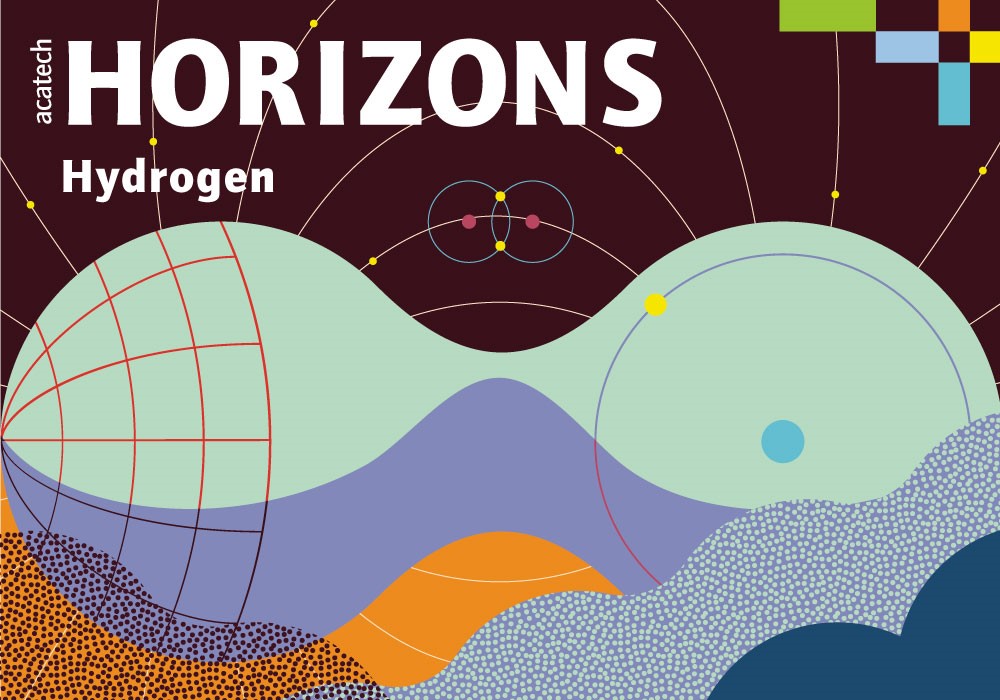Hydrogen: Germany should take a more international approach

Munich, 15 May 2023
Will hydrogen save our climate and our economy? This was the topic of an online panel discussion in which hydrogen experts Robert Schlögl, Nikolas Iwan and Ulrike Hinz participated on 4 May. As it transpired, there isn’t a simple answer to this question. Only one thing is clear: the international community must work together now to define the criteria for a global hydrogen economy. The event was organised by the acatech HORIZONS project and took place during the convention Berliner ENERGIETAGE.
acatech President Jan Wörner opened the online event by saying, “Our topic for today actually harks back to the Big Bang.” The universe originated with the Big Bang, said Jan Wörner, and 90 per cent of the universe is hydrogen. Thus, hydrogen is a central element in the universe and on Earth. It can be immensely useful for us; for example, to produce energy.
The question is, what role will hydrogen play in our future energy supply? According to Robert Schlögl, President of the Alexander von Humboldt Foundation, a very significant role. For energy supplies to be sustainable, electricity must come from renewable sources, such as sun and wind. “However, these renewables are often in the wrong place at the wrong time,” said Robert Schlögl. Some places on Earth get too much sun while in other places it hardly shines at all. Robert Schlögl sees hydrogen as a solution that can store renewable energies and transport them over long distances.
Hydrogen and green electricity go hand in hand
Ulrike Hinz, Policy Advisor Climate and Energy at WWF Germany, also believes that hydrogen is an important part of a climate-friendly future. She said, “Electricity should be the preferred solution but a purely electrical operation is not yet possible in all cases. Most ships and planes cannot be powered by electricity. Hydrogen is an alternative in these instances.” Also, some sectors of industry need hydrogen. One example is the steel industry, where, currently, coal is burned to heat iron ore; in the future, hydrogen could replace coal. According to Ulrike Hinz, this would also cut carbon emissions. The other panellists shared the view that electricity is not always the best solution. “We will need both electricity and hydrogen for a sustainable future,” added Nikolas Iwan from H2 MOBILITY.
Moderator Julia Nestlen asked where Germany and the EU can source green hydrogen. Ulrike Hinz cited countries in the Global South, such as Chile and South Africa, as examples. She believes there is plenty of opportunity in working with these countries. “We in Germany and Europe can strengthen our international energy relations.” At the same time, she said, the local community must be brought on board so that hydrogen is produced not only for export, but also for the local industry, thereby strengthening the economy of, and lowering emissions in, the producing countries. All the panellists agreed that social and environmental criteria must be defined for this at international political level.
Requirements for a global hydrogen economy
However, very little renewable hydrogen is available at the moment, said Julia Nestlen, raising a question from the audience. So, how can the world switch to green hydrogen? Nikolas Iwan cited two options, “Either we wait five years or we create market demand now and, by doing so, speed up the production of more green hydrogen.” Robert Schlögl’s considerations were similar, “We have to open one door before we can close the other.” We first have to use hydrogen – even if it is being produced from natural gas – and then we can move away from fossil fuels.
To open this door we need an adaptable infrastructure, large numbers of customers and the political framework, agreed Robert Schlögl and Nikolas Iwan. “We won’t have the solution to the transport of hydrogen,” said Robert Schlögl. We rather have to build up a diverse infrastructure because, depending on how far away the producing country is, the hydrogen will have to be piped as a gas or transported as a liquid, for instance ammonia, by container ship. Nikolas Iwan added that Germany would also be well served to be more pragmatic and more open to new technologies– and perhaps more amenable to other options because, as Ulrike Hinz said, “Hydrogen is only one solution towards a climate-neutral future.” Other options include saving energy and the direct electrification of as many sectors as possible; but these are topics for another panel discussion.
Further information
The online panel discussion was held as part of Berliner ENERGIETAGE, an energy economy and energy policy conference. The concept for the event was created by the acatech HORIZONS project, based on the publication acatech HORIZONS: Hydrogen, which gives a comprehensible, clear and science-based overview of the subject.
You are welcome to download and freely use all the infographics in the digital press pack, provided you state the copyright as © acatech HORIZONS.








